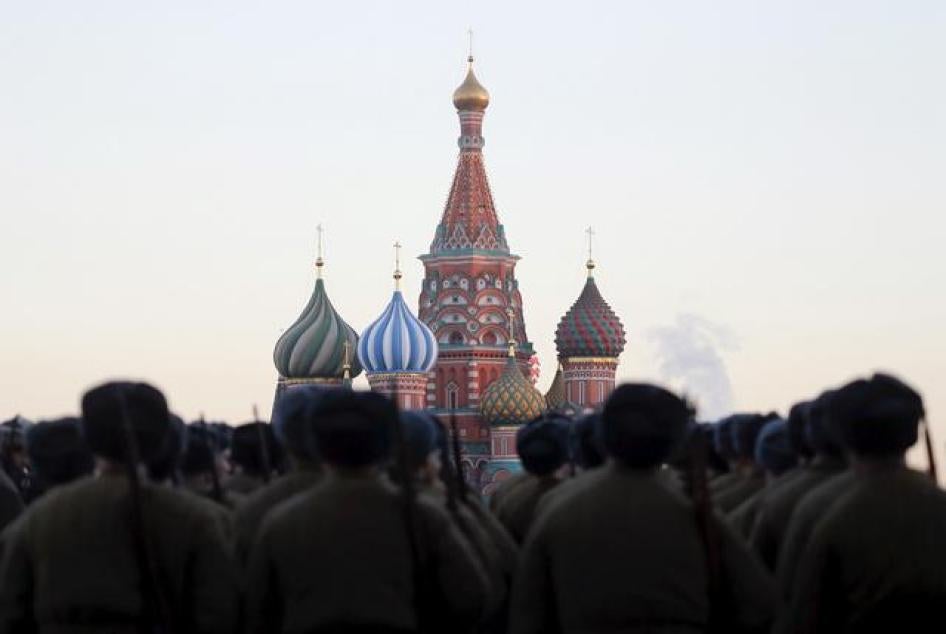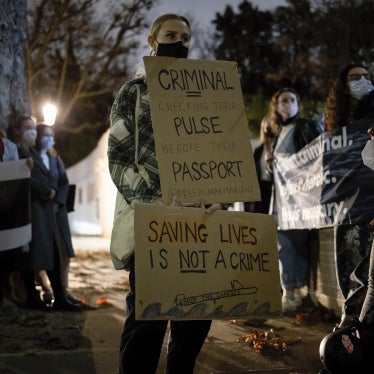(Moscow) – The Russian government tightened control over already shrinking space for free expression and stepped up persecution of independent critics during 2016, Human Rights Watch said today in its World Report 2017. The parliament passed new restrictive laws that expand the powers of law enforcement and security agencies, including to control online speech and keep dissenters in check. Kremlin-controlled broadcasters conducted smear campaigns against government critics.
“Today, Russia is more repressive than it has ever been in the post-Soviet era,” said Tanya Lokshina, Russia program director at Human Rights Watch. “People in Russia are paying an ever-higher price for speaking their mind and working to protect the public interest.”
In the 687-page World Report, its 27th edition, Human Rights Watch reviews human rights practices in more than 90 countries. In his introductory essay, Executive Director Kenneth Roth writes that a new generation of authoritarian populists seeks to overturn the concept of human rights protections, treating rights as an impediment to the majority will. For those who feel left behind by the global economy and increasingly fear violent crime, civil society groups, the media, and the public have key roles to play in reaffirming the values on which rights-respecting democracy has been built.
Russian authorities increasingly refused to approve public protests and punished demonstrators participating in unsanctioned peaceful gatherings. In November, Ildar Dadin, who is serving a two-and-half year sentence for a series of peaceful, single-person pickets, informed his lawyer that prison staff had beaten and threatened him. An investigation into his allegations is pending.
The authorities used a 2012 law to demonize as “foreign agents” dozens of nongovernmental organizations, including leading independent rights groups and research organizations. Between 2012 and 2016, at least 30 groups closed down rather than accept the label. In June, authorities for the first time prosecuted an activist under the law, charging Valentina Cherevatenko, chair of a human rights and peace-building group, with failing to register as a “foreign agent.” If found guilty, she faces up to two years in prison.
In July, President Vladimir Putin signed into law amendments that boost security services’ surveillance powers and unjustifiably interfere with privacy rights. The amendments require cellular and internet providers to store all communications data for six months and all metadata up to three years for potential access by security services. They also ban religious activities outside of officially recognized religious institutions, increase penalties for vaguely defined “public justification of terrorism” online, and severely penalize involving people in so-called mass unrest.
Russian authorities pressed criminal “separatism” charges against several people, including for online remarks about Crimea being part of Ukraine. In May, officials charged Ilmi Umerov, a former deputy chairman of the Crimean Tatars’ elected representative body, the Mejlis, for criticizing Russia’s occupation of Crimea. They forcibly hospitalized him for three weeks for a psychiatric evaluation. His case is pending.
Russia’s actions in occupied Crimea created a human rights crisis. Russia provided military and financial assistance to anti-government forces in eastern Ukraine but made no tangible attempts to rein in their abuses.
Russia’s military intervention jointly with Syrian forces led to rising civilian casualties in Syria, including from unlawful aerial attacks, some of them on schools and hospitals. The attacks included the use of air-dropped cluster munitions, and of incendiary weapons in populated areas. While it is difficult to determine whether Russian or Syrian aircraft conducted any particular attack, Russia’s active role in joint military operations means that it shares responsibility for the violations even when its aircraft were not directly involved.
The human rights situation in Russia’s North Caucasus deteriorated further. In Chechnya, local authorities cracked down on and punished even the mildest critics of Chechnya’s strongman leader, Ramzan Kadyrov. Chechnya’s authorities also attacked journalists and human rights defenders.
Chechnya’s leadership pursued collective punishment, including punitive house burnings, against relatives of alleged Islamist insurgents, and ruthlessly persecuted Salafi Muslims, equating them with supporters of jihadi insurgency.
Authorities in Dagestan placed local Salafi Muslims on watch lists, repeatedly detained and questioned many of them without specific grounds; raided Salafi mosques; and carried out mass detentions of believers.








